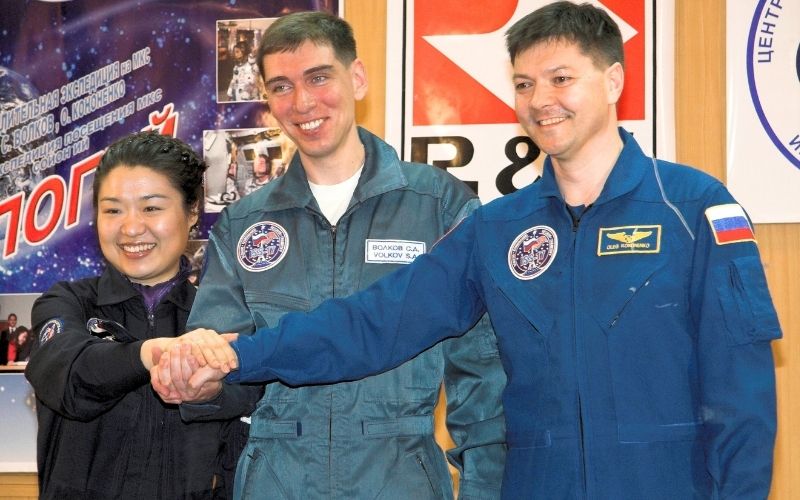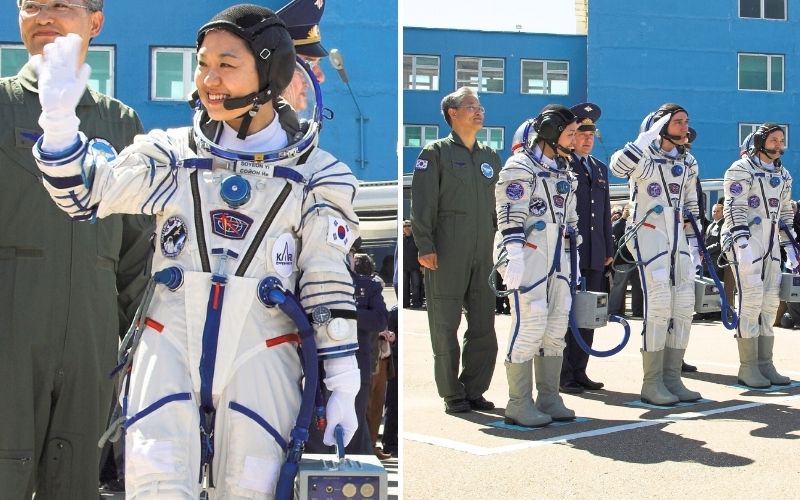- 한국어
- English
- 日本語
- 中文
- العربية
- Español
- Français
- Deutsch
- Pусский
- Tiếng Việt
- Indonesian
By Honorary Reporter Volga Serin Suleymanoglu from Turkiye (Turkey)
Yi Soyeon, Korea's first and only astronaut, made history in 2008 by beating out 36,206 candidates to join a mission to the International Space Station (ISS). During her 11-day journey, she worked on many scientific experiments in advancing research on space and biosystems.
In a Dec. 23 Zoom interview, Yi shared what she experienced in the astronaut selection process, training, and the challenges and wonders of life aboard the ISS. Passionate about developing the next generation of STEM leaders with her wealth of knowledge and experience, Dr. Yi’s story continues to inspire young innovators to reach for space. The following are excerpts from the interview.
Briefly introduce yourself.
I am Yi Soyeon, Korea's first astronaut. I was born and raised in Gwangju and completed my undergraduate, master's and doctorate degrees at the Korean Advanced Institute of Science and Technology, aka KAIST, in Daejeon. In December 2006, I was selected as one of two candidates for the Korean astronaut program.
After a year of training in Russia and a week of Korean-specific training, I went into space from Baikonur Space Center in Kazakhstan on April 8, 2008.

This is a screenshot from the Dec. 23 Zoom interview with Yi Soyeon Y (left). (Volga Serin Suleymanoglu)
Why did you want to become an astronaut?
Honestly, I wasn't particularly curious about space as a child. My parents didn't have advanced education and I was the first in my family to attend college, but they were always supportive of my education. I applied for the astronaut program out of curiosity.
At the time, I was a Ph.D. student doing experiments for my dissertation, and the idea of conducting experiments in space fascinated me as a milestone for an engineer. I didn't expect to be chosen and becoming an astronaut was never my dream, but it became a remarkable part of my journey.
What was the selection process like?
Korea's astronaut program was a three-year government project. The first year was for selecting astronauts and preparing experiments for the ISS, while the second was to train the final two candidates in Russia and finalize experiments with Korean scientists. The third was to analyze data and publishing findings.
The selection process began in April 2006 and picked two candidates from a pool of 36,206 by December that year. Hearing my name as one of the finalists was surreal. I was shocked and overwhelmed with all emotions as I prepared for this historic role.

Yi Soyeon (left) on April 7, 2008, is shown on the eve of her historic journey to space with her Soyuz TMA-12 crew at their quarters in Baikonur, Kazakhstan: Expedition 17 Commander Sergei Volkov (center) and flight engineer Oleg Kononenko. (NASA, Victor Zelentsov and public domain via Wikimedia Commons)
What preparations did you need to do before going to space?
My training was less physically demanding than expected. We were already fit, so workouts were limited to twice a week of under two hours to maintain our fitness. The biggest challenge was learning Russian from scratch. I had to become fluent enough to communicate during the mission in just five to six months. In addition, the program covered space systems, safety procedures and 16 experiments designed by Korean scientists.
What do you remember about the moment you blasted off into space?
My launch wasn’t exactly normal. During preparation, my commander's spacesuit burst, which created an emergency before we launched. We had to resolve that first, testing his spacesuit several times in the capsule. Large committee meetings were held to decide if it was safe for him to proceed with the spaceflight, giving me no time to focus on how dangerous or exciting the situation was. We were so busy dealing with the unexpected problem, hoping everything would work out.

Yi Soyeon on April 8, 2008, waves goodbye before boarding the rocket at the Baikonur Cosmodrome in Kazakhstan (NASA, Victor Zelentsov and public domain via Wikimedia Commons)
In space, how did you feel when you first saw Earth?
I realized how close we were, just 400 km away. From that distance, you can't see the whole planet or even all of the Korean Peninsula, only about a third of it. We orbited Earth 16 times a day, so inside the capsule, it felt like we were moving incredibly fast. Despite Earth's vastness, being up there makes you realize how small and vulnerable humans are.
What was your stay at the ISS like?
I stayed in space for 11 days, two traveling in the capsule and nine at the ISS. Over 70% of my time was spent conducting experiments, while the rest was for other tasks. My favorite moments were cultural activities, TV and radio interviews, and interacting with Korean children on Earth, as well as managing the space classroom. The experienced astronauts told me that I was likely the busiest astronaut ever at the ISS, with workdays lasting at least 12 hours. Unexpected challenges and delays made the schedule even more hectic, but with support and effort, I completed all my tasks.
Any message to those wanting to become astronauts or pursue their dreams?
The only advice I can give is to do your best. There are no shortcuts, hidden secrets or special recipes. Just follow your feelings and trust your gut because your instincts are usually right. Everyone's journey is different, even for astronauts. Every year, every mission and every country present a different path, so you can't predict or rely on a secret formula.
msjeon22@korea.kr
*This article is written by a Korea.net Honorary Reporter. Our group of Honorary Reporters are from all around the world, and they share with Korea.net their love and passion for all things Korean.